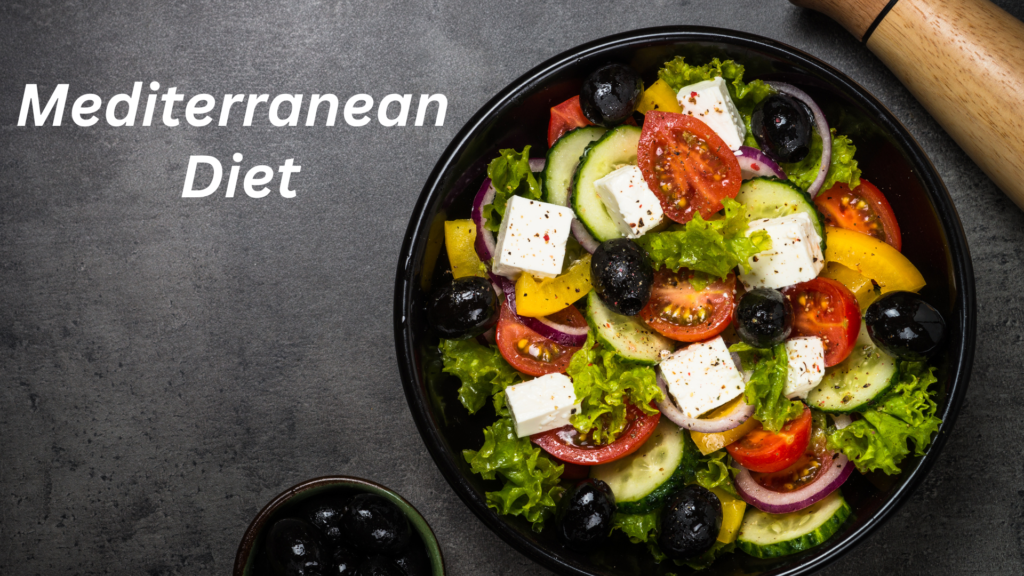It’s not just a meal plan, it’s a lifestyle that highlights fresh ingredients, flavorful dishes, and communal dining. It’s not only about what you eat but how you enjoy it. The Mediterranean diet is rich in fruits, vegetables, whole grains, nuts, seeds and delicious seafood.
Health Benefits
This eating pattern highlights whole foods like fruits, vegetables, legumes, whole grains, fish, and healthy fats like olive oil that work synergistically to enhance overall well-being. Mediterranean diet can significantly lower the risk of chronic diseases such as heart disease and type 2 diabetes by improving cholesterol levels and reducing inflammation.

Lifestyle Components
Lifestyle components are the building blocks of a healthy and balanced life, blending what we eat with how we move and think. Activities such as walking, cycling, or even dancing can enhance creativity and social connection while reducing stress levels. Adopting practices such as mindfulness or deep-breathing exercises helps cultivate emotional balance amidst life’s challenges.
Stress Reduction
Omega-3 fatty acids found in fatty fish like salmon and walnuts help mitigate anxiety levels and promote overall brain health. the abundance of antioxidants from fruits and herbs think vibrant berries and aromatic rosemary can combat oxidative stress in the body.
Meal Planning
Meal planning is not just about deciding what to eat for the week, it’s an invitation to explore and embrace the vibrant flavors of the Mediterranean diet. This approach, rich in fresh vegetables, whole grains, lean proteins, and healthy fats like olive oil, makes it easier to create balanced meals that are both nourishing and satisfying.

Variations & Consideration
Mediterranean diet showcases remarkable variations influenced by regional ingredients and cultural traditions. it’s essential to recognize that it’s more than just a set of foods, it’s a lifestyle promoting mindful eating practices.
Getting Started
Diet journey opens a world of vibrant flavors and nourishing ingredients, making it more than just a meal plan it’s a lifestyle transformation. Start by familiarizing yourself with core components like whole grains, fresh fruits and vegetables, lean proteins such as fish and poultry, and heart-healthy fats found in olives, nuts, and avocados.
Scientific Research
This dietary pattern, rich in fruits, vegetables, whole grains, and healthy fats from olive oil and nuts, is associated with lower incidences of heart disease and stroke. The anti-inflammatory properties of food such as fatty fish and legumes play a critical role in promoting cardiovascular health by optimizing lipid profiles.
Comparison To Other Diets
When comparing the Mediterranean diet to more restrictive eating plans, such as the ketogenic or paleo diets, its flexibility becomes a remarkable strength. Rather than eliminating entire food groups, the Mediterranean diet emphasizes an abundant consumption of fruits, vegetables, whole grains, and healthy fats like olive oil.

Weight Management
Mediterranean diet particularly appealing for sustainable weight management is its flexibility and cultural richness. Rather than strict calorie counting or food restrictions, it encourages mindful eating a practice where individuals savor every bite while nourishing their bodies with nutrient-dense choices.
Social Eating
Social eating can significantly impact mental well-being. Engaging in regular mealtime rituals within a community brings a sense of belonging, reducing feelings of isolation and stress that are prevalent in today’s fast-paced world.
FAQs
1. What is the Mediterranean diet?
It is a eating habits of countries bordering the Mediterranean Sea, emphasizing whole foods like fruits, vegetables, whole grains, legumes, nuts, fish, and healthy fats such as olive oil.
2. What are the main components of the Mediterranean diet?
High intake of plant-based foods, healthy fats, moderate consumption of fish and poultry, limited dairy and red meat, and an emphasis on herbs and spices for flavor.
3. Can I lose weight on the Mediterranean diet?
Absolutely, it contain nutrient-dense foods that can help with weight management while providing essential nutrients without excessive calories.
Conclusion
Mediterranean diet offers a wealth of health benefits, including improved heart health, enhanced cognitive function, and better weight management. Rooted in the traditional eating habits of countries bordering the Mediterranean Sea, this diet emphasizes whole foods such as fruits, vegetables, whole grains, lean proteins, and healthy fats like olive oil.
